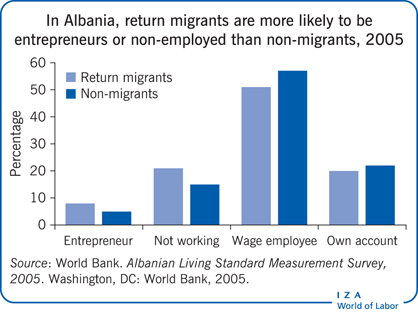Elevator pitch
The occupational choice of return migrants is important to their home country. Return migrants are likely to have acquired human capital while abroad, either through formal training or by working in a more efficient labor market. The employment of these newly acquired skills in the home country can have important economic implications. Examining the choice of return migrants to engage in wage employment, self-employment, entrepreneurial activity, or to remain out of the labor market makes it possible to ascertain whether the initial migration decision benefited the home country as well as the migrants and their families.

Key findings
Pros
Migrants who return to their home country are likely to benefit from higher wages than they would have earned had they not migrated.
Return migrants are more likely than non-migrants to invest in entrepreneurial activities.
The survival rates of businesses established by return migrants are likely to be high.
Optimal migration duration and occupation-specific labor market experience for higher-skilled return migrants are likely to result in higher wages upon return and help in their transition to formal employment.
Cons
If migrants choose not to work when they return home and consume their savings instead, potential gains from migration will be lost.
Depending on the duration of the migration experience, return migrants may lose their social network in the home country.
For return migrants who stay abroad too long, the reservation wage in the home country is likely to be higher than for those who return after a shorter period; this can result in long spells of non-employment after return.